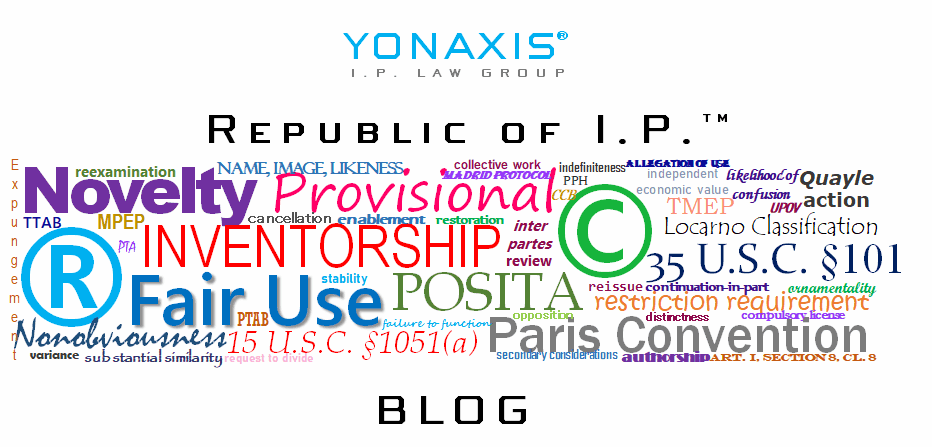Today is Constitution Day. On this day, September 17, 1787, the U.S. Constitution was signed thirty-nine Founding Fathers, ushering the birth of the United States. Several clauses in the Constitution have direct import to intellectual property. Article I, Section 8, Clause 8 is the Patent and Copyright Clause, which is the basis of U.S. patent …
Author: Yonaxis
TechPat: U.S. Patent No. 10,360,269 B2
The Oracle OpenWorld 2019 conference will be held in San Francisco from September 16-19, 2019. To commemorate Oracle OpenWorld, the blog will highlight a recently-issued Oracle, Inc. patent. U.S. Patent No. 10,360,269 B2 (‘269), issued on July 23, 2019, for “Proxy databases.” The inventor is Thomas Baby of Auburn, Washington. The applicant and assignee is …
TechPat: Gilead Petitions for IPR on Truvada Patents
On August 23, 2019, Gilead Sciences, Inc. petitioned the PTAB for inter partes review of three patents behind its blockbuster TRUVADA® HIV-prevention drug. The patents, U.S. Patent No. 9,044,509 (‘509), 9,579,333 (‘333), and 9,937,191 (‘191) were all filed by the U.S. Department of Health and Human Services, and the federal agency is still listed as …
Update: USPTO Issues Revised Counsel Rules
On September 5, 2019, the U.S. Patent and Trademark Office issued a revised Examination Guidelines 4-19, “Requirement of U.S.-Licensed Attorney for Foreign-Domiciled Trademark Applicants and Registrants.” The Exam Guidelines 4-19, originally effective on August 3, 2019, were new formal requirements for trademark applications originating by applicants domiciled outside the United States. The rules originally required …
New TM Counsel Rules Creating Problems with Immigration Requirements
The USPTO promulgated new rules on August 3, 2019, requiring foreign entities applying for a trademark registration to retain U.S.-based counsel for filing and prosecution of the trademark application. The new rule specifically requires all trademark applicants to retain a U.S.-admitted attorney to handle all trademark matters before the USPTO. The rule was aimed at …
CannabIP: U.S. Patent No. 10,245,237 B2
U.S. Patent No. 10,245,237 B2 (‘237) issued on April 2, 2019, for “Compressed Tablet Containing Cannabidiol, Method for its Manufacture and Use of Such Tablet in Oral Treatment of Psychosis or Anxiety Disorders.” It was issued to inventors Jan Albert de Vries, of Zelhem, Netherlands, Maria Vanesa Fernandez Cid, of Haarlem, Netherlands, Ana Maria Hervedia …
CannabIP: DEA Legalizes Some CBD Products
On August 26, 2019, the U.S. Drug Enforcement Administration (DEA) announced an expansion of a federal program allowing legalized cannabis research, by allowing additional applications from cannabis cultivators. In doing so, the DEA will increase the pool of potential legal sourcing of cannabis for medical and scientific research. Currently, the only cannabis that can be …
TechPat: U.S. Patent No. 10,337,029 B2
The Regents of the University of California was recently issued a seventh patent in their portfolio of CRISPR-based research. U.S. Patent No. 10,337,029 B2 (‘029) issued on July 2, 2019, for “Methods and Compositions for RNA-Directed Target DNA Modification and for RNA-Directed Modulation of Transcription.” It was issued to inventors Jennifer A. Doudna and Martin …
Fed Circuit Watch: Fed Circuit Declines to Expand Design Patent Law
On July 23, 2019, the Court of Appeals for the Federal Circuit publicly released an intriguing design patent ruling involving design patents covering Ford’s F-150 truck. In Automotive Body Parts Assn. v. Ford Global Techs., LLC,[1] the Fed Circuit declined to expand trademark law’s functionality doctrine to design patent law, and also declined to create …
Fed Circuit Watch: Issued Patents are Presumptively Valid and Patent-Eligible
On June 25, 2019, the Court of Appeals for the Federal Circuit handed down CellSpin Soft, Inc. v. Fitbit, Inc.,[1] in what is an important case dealing with patent-eligibility under 35 U.S.C. §101, further hardening by the Fed Circuit that factual allegations in the pleadings can support patent-eligibility. Further, Cellspin held that issued patents are …
